
Choosing Tewson: A star of the second row
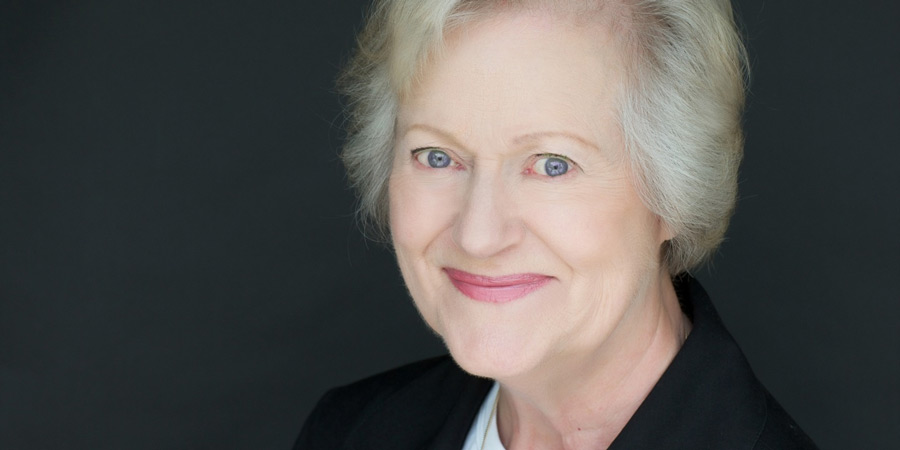
'Supporting actor' is a strangely condescending phrase, suggestive of a combination of cheerleader and girdle. They are, nonetheless, crucial to the believability of any scene, conjuring up the constellation while one focusses on the star.
The insecure performer front and centre, who fears being upstaged, fails to realise that they only look as good as those around them seem real. The smart ones, therefore, understand their Stanislavski - 'There are no small parts, only small actors' - and surround themselves with the best that they can get.
Josephine Tewson, in the context of British comedy, was one such supporting actor. More or less all of the country's finest comic performers were keen to have her as a key member of their cast. Ronnie Barker, Ronnie Corbett, Dick Emery, John Inman, Frankie Howerd, Charlie Drake, Hywel Bennett and Patricia Routledge were among those who valued greatly the validity that she would always bring.
What made her one of the special ones of the supporting players? It seems that, like all of the best of that breed, she was blessed with far more ability than ego.
Born on 26th February 1931 in Hampstead, north London, the only child of William and Kate, she grew up in a family that treated the stage as a means to perform rather than preen. Her father was an accomplished musician who played the double bass in the BBC Symphony Orchestra; her mother, who worked as a nurse, was sometimes heard mock-complaining to William that a flute would take up far less room, and always talked of her husband, in a professional sense, as part of an ensemble instead of a singular figure.

Josephine was quite a shy child who, rather than being driven by any burning ambition, merely exhibited a mild inclination towards following her father into the music world. 'If we hadn't moved around so much because of the war ,' she later reflected, 'I would have learnt an instrument.'
An eager reader while at school, she was considering going to the University of Durham to study English Literature when one of her teachers, a Mr Chapman, told her parents that, given how well she had always engaged with the plays they had surveyed, she possessed the right kind of passion be an actor. The idea, it seems, had never seriously crossed her mind before this time, but the suggestion sparked it sharply into life.
'In those days,' she would later say, 'I thought you worked and got paid for it but you did all your enjoying yourself in your spare time. It hadn't occurred to me that you might be able to earn your living doing something you loved.'
The consequence was that she auditioned for, and subsequently won a place at, the Royal Academy of Dramatic Art. Among her contemporaries there were Sylvia Sims, Nanette Newman, David McCallum, Diane Cilento, Ian Holm, and Sheila Hancock. She studied the usual canon of classics while she was there, performed in front of John Gielgud, Sybil Thorndyke and John Mills, who awarded her a prize, and she graduated in 1952.
She went straight from there into working in rep as a member of the Easdale Theatre Company, first in Darlington and then Mansfield, getting used to the discipline and flexibility of learning a new role each week and playing twice nightly in a wide range of plays that stretched all the way from Shakespearean tragedy to Feydeau farce.
Often praised by the local press for the quality and consistency of her performances, with one review describing her as 'a young actress of great charm and promise,' it would still take a few years before she finally started to get noticed by the major agents and producers in London.
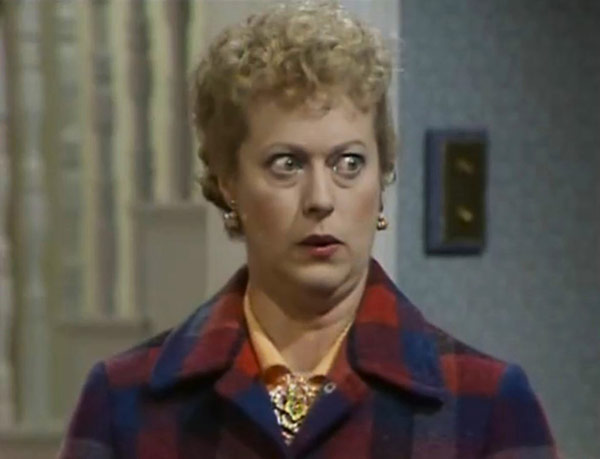
Moving, by the early Sixties, to the Everyman Theatre at Cheltenham, she appeared, as her colleague Tudor Williams would put it, 'in everything and anything and soon became everyone's favourite actress'. From there, within a year or so, she was welcomed into the West End, which is where she would stay for much of the decade.
She had made her television debut in an episode of the detective series Charlesworth on 5th September 1959, and followed this with the odd appearance in a BBC or ITV play, as well as a few one-off minor roles in the likes of Z Cars, Sergeant Cork and Emergency Ward 10. She would continue to be regarded very much as a stage actor, however, until Charlie Drake, having been so impressed by her performance in a recent comic play that he had seen, hurriedly rewrote the scripts for his forthcoming series in order to add her to as many of the sketches as he could manage.
The Charlie Drake Show thus began - on 10th December 1967 - with Tewson as a regular member of the cast. She enjoyed working with the star on the screen ('He was very kind to me'), but was less comfortable spending any time with him off it (Drake was a notoriously lascivious sort of character - his catchphrase, 'Hello my darlings,' had first come about as a greeting to all of the breasts with which, being a mere five-foot one-inch in height, he found himself facing - as well as a sometimes alarmingly temperamental colleague) and she was rather relieved to go back to the theatre when the series was finally over.
During the summer of 1968, however, she came to work with the far more gentlemanly Ronnie Barker, and another TV opportunity arose. They were appearing together in the West End production of Tom Stoppard's The Real Inspector Hound, with him playing a philandering theatre critic and her an elderly and calmly observant maid.
Barker, by this time, was already a regular on radio, as well as a fairly familiar figure on television, always in demand because of his versatility as a character actor in drama as well as comedy. He was associated particularly with David Frost, having been made a regular in the latter's various TV projects ever since, in 1966, he became a cast member of The Frost Report.
His latest small screen venture, which was about to start that August on ITV, was Frost On Sunday, which was set to feature a mixture of chat, music and some comedy sketches. Barker was booked to appear alongside Ronnie Corbett, with whom he had recently established a strong rapport as an unofficial double act.
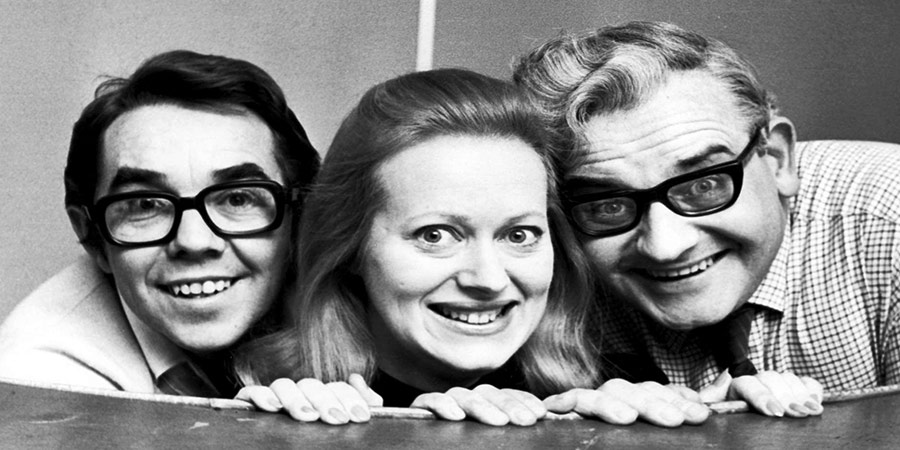
What Frost and the others knew that they also still needed, however, was a talented female performer to contribute to all the comedy. It was after a couple of weeks of working with Tewson, during which he realised what excellent chemistry they shared, that Barker came to be convinced that she would be perfect for the show, and so he recommended her to Frost.
'They needed a girl for the sketches in Frost On Sunday as it was all live so they couldn't do it all themselves,' Tewson would recall, downplaying, as usual, how enthusiastic Barker had been about bringing her in. 'He knew I was free on Sundays as I was working in the theatre, and it went from there.'
It was, as the saying goes, the beginning of a beautiful friendship - one that would last for the rest of their lives. 'She knew what she was doing,' Barker would say of her, 'and you knew you could rely on her. You never had time to experiment in these things, the pressure was relentless, so you had to have someone who was not only good but was also able to cope if anything went wrong. Jo was like that. You knew she was excellent and you also knew you could trust her.'
'He was absolutely adorable,' Tewson would say, in turn, of Barker, 'he was the person I most enjoyed working with. He was so good; he wrote all the scripts and could act any character instantly. He never needed to practice. He would play the character perfectly from the beginning.'
The experience of working in live TV certainly tested her temperament as well as her talent. It was, she said, 'terrifying but exhilarating'.
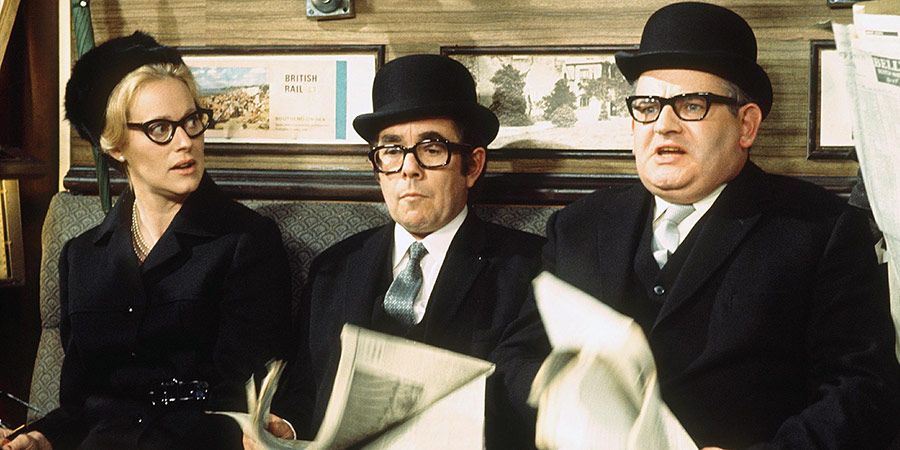
'The worst thing that happened to me,' she would recall of her time on the show, 'was in a sketch where I was an au pair girl and had to end up doing a terrific emotional scene. I thought it would be a marvellous idea if I could cry, but there wasn't even time to apply glycerine tears.
'Somebody told me that if I put an ampoule of ammonia right under my nose, the tears would come immediately. So I did. Not a single tear, but I felt as though the top of my head had been blown right off!'
She was comforted by the fact that everyone else in the cast had to cope with their own private crises. Even Ronnie Barker suffered the odd 'live' anxiety.
'He had a monologue which he had to read from the autocue,' she would remember. 'He'd had a really quick change, ran into the studio, said "Good evening" and realised he didn't have his glasses and couldn't see the autocue.
'He patted his pocket and, as luck would have it, they were in there but they could have still been in the dressing room, anywhere. The sweat was pouring out of his forehead, and we all knew, but he just carried on as if nothing had happened and nobody would have noticed at home.'
Such white-knuckle moments served to bring the actors even closer together. A strong mutual respect developed as each not only learned to cope with their own challenges, but also did what they could to help the others overcome any unexpected obstacle. Tewson, certainly, soon earned the trust of all of the team as a quick-witted and uncomplaining 'trouper'.
Indeed, her funny and finely-timed performances in Frost On Sunday - no fewer than forty-six-weeks'-worth in all - soon saw plenty of other comedy productions start competing for her services. She appeared regularly, for example, in The Dick Emery Show (1969-70) and three separate Jimmy Tarbuck vehicles (1973-75), as well as alongside Bill Owen in the sitcom Coppers End (1971) and Terry Scott and Mollie Sugden in the series Son Of The Bride (1973).
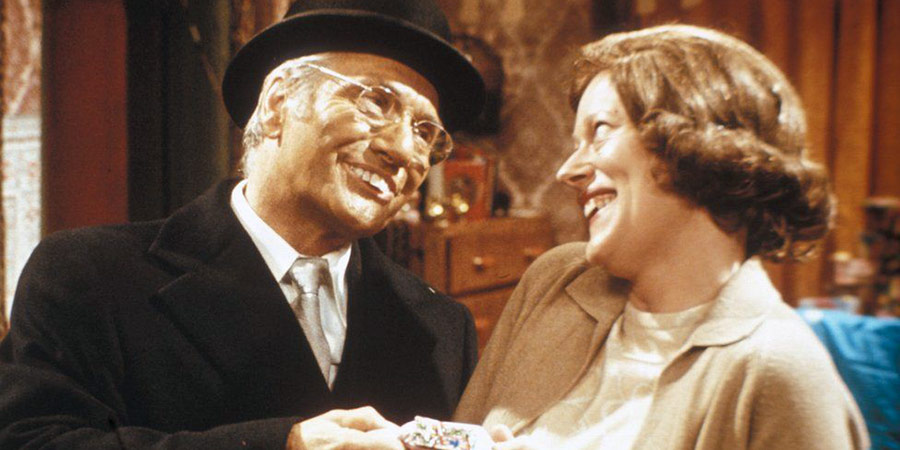
The critics certainly appreciated her. As one of them wrote, as they commented on the latest of her many contributions to such comics' series: 'Josephine Tewson [is] a comedienne who has lifted many a show in the past, and when she was around there was that little bit of individuality which made all the difference'.
She was enjoying each new challenge, even if, deep down, she was feeling just a little constricted by the focus on sitcoms and sketch shows at the expense of drama. 'I'm beginning to feel,' she said after supporting yet another comic performer, 'like a female Deryck Guyler.'
It would be her association with Ronnie Barker, however, that would prove the most enduring. She played opposite his eccentric aristocrat Lord Rustless as the loyal but scatter-brained secretary Mildred Bates in the related series Hark At Barker (LWT, 1969-70) and His Lordship Entertains (BBC, 1972).
She also played countless comic roles in The Two Ronnies (1971-81). Her ability to capture middle class vulnerability, with a beguiling mixture of enthusiasm, naivety and nerviness, came in particularly handy for the many sketches that saw one or the other Ronnie blunder into various social solecisms.
Her eyes, big, bright and slightly bulging, were always well-employed in these comic situations, widening to an almost cartoon-like extent to register shock or excitement, and while few performers could also blush on cue, she seemed to be able to redden her cheeks at will. She even used her earrings to dramatic effect, making them shake, swing or circle to further accentuate her emotional state. Such visual tricks drew the camera to her even when, as was often the case, her lines were few and far between, and helped balance those sketches that would otherwise have been overly wordy and sometimes too static.
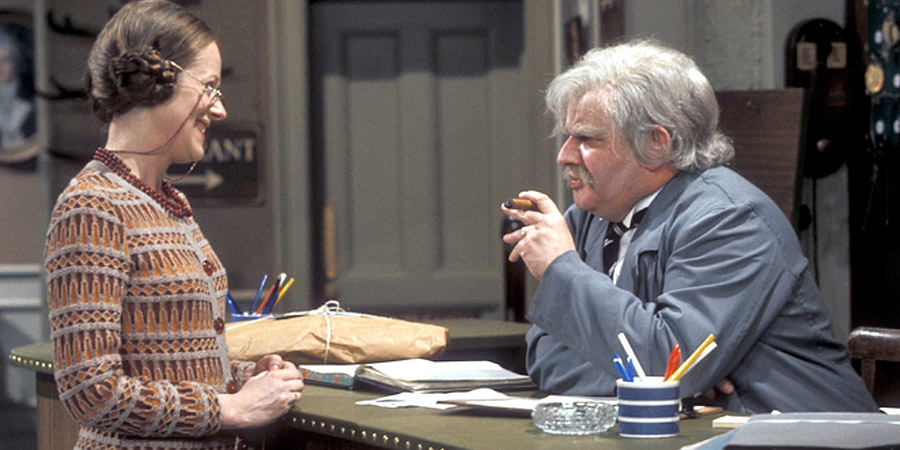
Both Ronnies, as a result, valued greatly her contributions to their comedy. They knew, like many others now did, that she was one of the best supporting players in the business, always supplying precisely the right level of distracting detail while still helping the stars at the centre to shine.
She was everything, and everyone, they needed her to be in those shows: the waitress, the shopkeeper, the secretary, the wife, the mistress, the dowager, the ingénue, the femme fatale or the fool. With her so reliable, the other two relaxed - which was particularly important for Ronnie Barker when, playing opposite her, he had extremely elaborate dialogue to deliver that needed, to elicit the best studio audience response, to be right on the very first take (such as the sketch in which he, as the word-mangling Rev. Spooner, is trying to give his wife an anniversary present:
SPOONER: I knew you needed a scentle of bot. Er, a sottle of bent. Um, perfume.
MRS SPOONER: Oh, yes, I did! And are you still taking me out tonight?
SPOONER: Sweetingly, my cert! I want you to go away and put on your hiteous little prat. I have reserved our usual nosy little cook, and ordered your favourite meal: chalk pots and dockled spick.
Her and Barker's final collaboration would be, two decades on, in his self-written farewell sitcom Clarence (1988), with her as the former maid Jane Travers, the object of his own character's affection, and a role written especially for her by Barker. It was, in a way, quite a neat conclusion for their comic partnership, as they were almost coming full circle, having worked together before on the basic idea back in a 1971 pilot as part of the series 6 Dates With Barker.
The fact that they knew each other so well would make for some of the best moments in the series, often tender and sweetly subtle, as they brought vulnerability and charm as well as exceptionally good timing to each scene that they shared. One example, from the sixth episode, saw Travers place an array of cooked meats on the kitchen table, only to be taken surprise midway through the meal when Clarence suddenly gives her a long and passionate kiss. Once their lips finally unlock, a dazed Travers gazes up at him and gasps: 'There's more tongue if you want it'.
It was a sign of how strong the bond had become between these two actors that, although Barker chose not to tell anyone else on the production that this was going to be his swansong, he did confide the news to Tewson. He wanted to make sure that she would not be surprised when, no matter how well the show went, there would be no second series, and he also wanted her to know that she had been his only choice with whom to share his final scenes. She was, she would later say, deeply touched by the gesture.
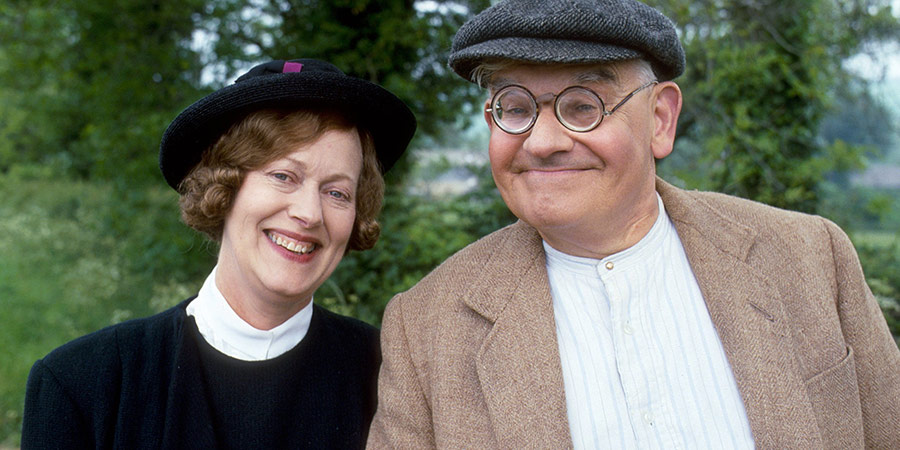
'I was terribly unhappy when he packed it in,' she reflected, but stressed that she respected his reasons for doing so. 'He didn't want his standards to drop,' she added, 'and he wanted to enjoy life. I would miss him, but I was happy for him.'
There were, beyond her work with Barker, several other career highlights for Tewson. There was, for example, the odd off-the-wall diversion, such as The Strange Case Of The End Of Civilisation As We Know It (a Sherlock Holmes spoof in which she appeared, briefly but memorably, alongside John Cleese, Arthur Lowe and Denholm Elliott as a police chief's somewhat over-devoted secretary) while, more importantly, the six series, between 1979 and 1983, that she spent in the ITV sitcom Shelley, saw some of her best sustained work on the small screen.
Acting opposite Hywel Bennett as Edna Hawkins, Shelley's prim but pliable landlady (more often referred to as 'Mrs H'), she was pitch-perfect from start to finish, the ideal fidgety comic foil for his charmingly languid idler. She made her character so vividly believable because she always listened and watched and thought before reacting, rather than - as many others tended to do in such relatively stereotypical sitcom roles - merely wait for her 'turn' in the text.
It was an especially invaluable approach given the fact that so much of the exchanges between her and Shelley were, on paper, basically standard double act crosstalk. It was her, along with Bennett's, skill that made such dialogue seem more characterful than contrived:
MRS H: You workshy twit!
SHELLEY: 'Workshy'? I've just applied for a position.
MRS H: What position?
SHELLEY: Missionary, for a start. Then, later on...
MRS H: ...Oh, it's that again, is it? Typical! Can't you leave her alone? She's got the baby, all the worry and the work. Things get on top of you, you know?
[Shelley grins, Mrs H starts blushing]
MRS H: Shut up!
Probably the most prominent of her sitcom roles would arrive in 1990 when she was chosen to play Elizabeth 'Liz' Warden, the neighbour and reluctant confidante of the deludedly snobbish Hyacinth Bucket, in Roy Clarke's Keeping Up Appearances. It was, once again, a part that required all of her actorly guile to prevent it from appearing little more than a weekly rinse-and-repeat of shocked and discomforted expressions.
Calm in the context of her own 'normal' home, she starts to lose control of her nerves, her words and her tea cup whenever sucked into the chaotic and socially-distorted milieu of Mrs Bucket. Most scenes, in most episodes, obliged Tewson to keep coming up with alternative yet still believable means of portraying a woman being bullied until she was teetering on the edge of a mini nervous breakdown - 'The trick,' she said with typical modesty, 'was trying to think of a different way to spill coffee every week' - and it was to her great credit that she kept on succeeding at doing so.
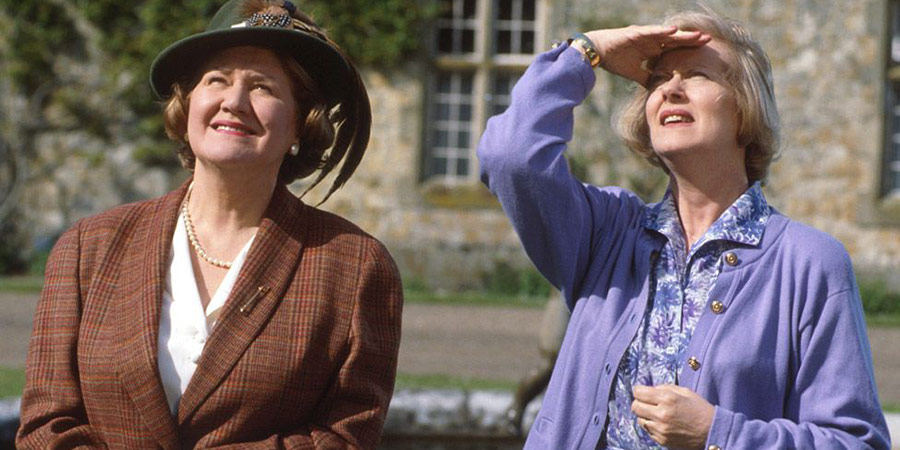
Patricia Routledge, this time around, was the star who benefitted from Tewson's outstanding technique. While she, as the force of nature that was Hyacinth, was always big, loud, and brash, Tewson lent the audience the eyes through which they could make sense of such a monster. As unnerved by this creature as so many watching would be, she was forever waiting for the next sudden trill of the telephone, the next knock at the door or the next bellow over the fence, an ordinary human being cornered and controlled by the life being performed next door.
Any reality rested on the quality of her reactions. Without the credulity that Tewson always crafted, Routledge would have been left stranded as a mere cartoon. It was because one could believe in Liz that one could also believe in Bucket ('Sometimes,' she said, 'you have to dictate to the audience when not to laugh or they'll run away with you').
She would go on to show a slightly different aspect of her artfulness in Last Of The Summer Wine, which she joined as a semi-regular in 2003 as the highly-strung but relentlessly romantic librarian Miss Davenport. Here she played a character who, with her wildly fluctuating passions, could unsettle others as often as (if not more than) they unsettled her.
Active as well as reactive, from scene to scene, it gave Tewson more opportunity to explore the nooks and crannies of the character, interacting with the rest of the ensemble as the plots pulled them one way or another. Opposite a Clegg or a Truelove, for example, she could move forward, step on toes and send the timid males scurrying off to safety, while opposite a more redoubtable rogue such as Gavin Hinchcliffe (played by Bernard Cribbins) she could bounce off their responses as well:
TRUELOVE: Is Miss Davenport often to be found at that angle?
HINCHCLIFFE: Oh, she can't handle drink, poor lass, on account of an old romantic injury. She thinks some fool promised to marry her.
DAVENPORT: It was YOU!
HINCHCLIFFE: Er, and that's another thing: she hears voices.
CLEGG: And misreads library books.
DAVENPORT: [Slurring sadly] I gave him the unrestricted use of my photocopier!
HINCHCLIFFE: A position I never abused!
DAVENPORT: [Brightening] That day at Cleethorpes...
HINCHCLIFFE: It was raining! I could hardly be expected to take her to the zoo!
DAVENPORT: ...he promised me marriage!
HINCHCLIFFE: No, ah, I never said 'marriage'! I may have said 'garage'...
DAVENPORT: [Confused] I have a garage.
HINCHCLIFFE: You see how easily the word could have cropped up?
DAVENPORT: [Smiling dreamily] 'We'll be together,' he said!
HINCHCLIFFE: N-No-no, the most I said was: 'Would she care to assist me with my experiments?' Er, would you excuse us a minute?
DAVENPORT: He's so strong when he's roused! I call him my Hercules!!
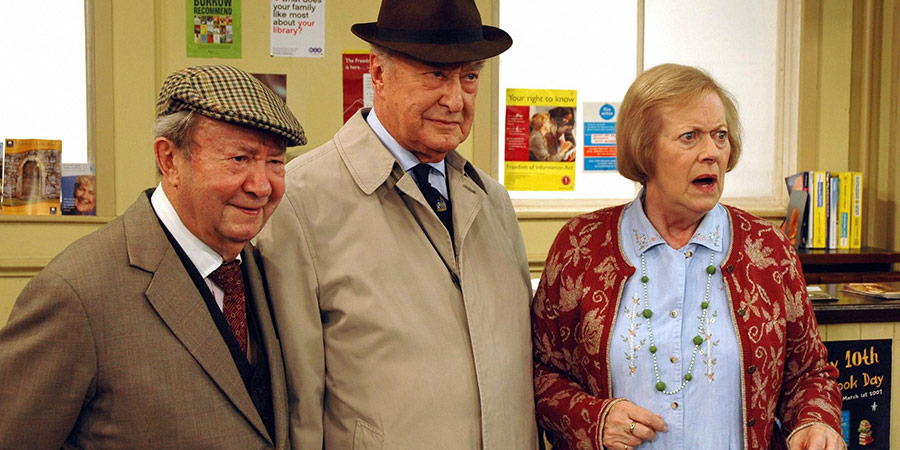
Her appearances in such internationally popular shows would give her, very belatedly, a further-flung form of fame, but her feet remained firmly on the ground, and she continued to regard herself, quite contentedly, as just an ordinary jobbing actor. Although she would admit to still feeling somewhat frustrated by the fact that her facility for comedy seemed to discourage producers from considering her for more of the kind of dramatic roles with which, in her early days, she had won so much praise, she was generally happy with the course that her life had taken.
In terms of her personal life, she married twice, with the first time being to her fellow actor Leonard Rossiter. They had met in the mid-Fifties when both started working for Salisbury Rep.
They appeared together in 1957 (with Tewson getting the better of the reviews) as a pair of news reporters in the hit musical Free As Air, starting at the Opera House in Manchester and then moving on to the Savoy Theatre in London. In what appears to have been an eminently cordial company, no fewer than six members of the cast ended up getting engaged to each other during the run, and Rossiter and Tewson were among them.
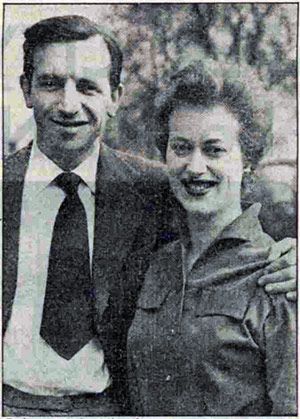
They married in 1958. Rossiter went on soon after to join the Bristol Old Vic, and Tewson worked there with him in a number of productions, the most notable being an adaptation of the Ionesco play Rhinoceros.
Rossiter, however, was, even in those early days, a notoriously prickly perfectionist, with his relentlessly forensic attention to the art of acting serving to shut out everything else. He could be generous and attentive to his wife as a fellow performer, analysing how she played a role or what techniques required a fine-tune, whilst rarely thinking of commenting on how she looked, how she felt, or what, outside of the stage, she might need some help or encouragement about.
She supported him. Sometimes he appreciated it, and sometimes he didn't. She was still very much a team player. He, increasingly, was inclined to sit in the shadows, somewhere in the auditorium, staring blankly up at the others, in a world entirely of his own.
The marriage, to the surprise of no one else around who witnessed it, fell apart after a couple of years. The divorce came in 1961. The end, for each of them, was sad, but not particularly bitter.
'He was a wonderful actor and a terrible husband,' she would say. 'That absolutely sums him up completely.'
She went on to marry again, this time far more happily, to a dental surgeon named Henry Newman in 1972. They lived, by all accounts, a very happy, and very private, life together until his death in 1980.
Outside of acting, she remained true to her family's traditional commitment to classical music. She was a regular visitor to the Royal Festival Hall and Royal Opera House as well as concert halls all around the country, was always happy to participate as a narrator whenever a musical event required such a contributor, and loved to relax at home by listening to recordings of the likes of Bach, Berlioz, Bartók, Mozart, Walton or Schumann, with a special preference, in memory of her father, for composers for the double bass such as Gubaidulina, Pichl and Zimmermann.
She was also an avid follower of test and county cricket. 'I belong to Middlesex,' she once remarked. 'My grandfather and uncle were great players so, as a little girl, I was always there getting in the way on the boundary. It's an enthralling game and very theatrical with this conflict between the bowler and the batsman.'
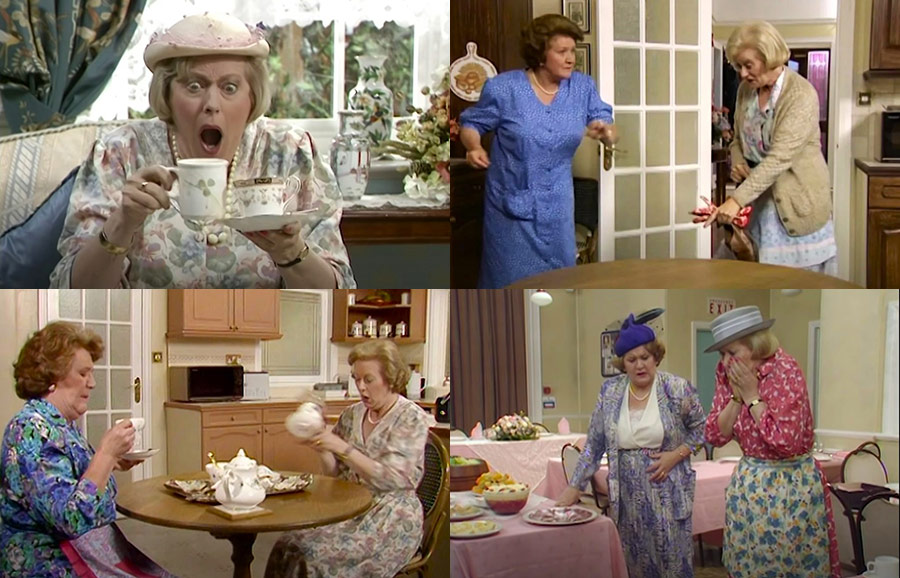
Football, she acknowledged, should have been another sport that she followed, seeing as her mother's father had been Haydn Morley, who played the game with some distinction for Derby County and Nottingham Forest and also captained Sheffield Wednesday. The activity, however, largely left her cold. 'I have to have it explained to me,' she would say, 'who Beckham is now and again.'
Never the kind of insulated actor for whom their perspective stretched no further than the back of the stage to the start of the proscenium arch, she possessed a healthy enough hinterland, and was an enthusiastic investigator of each town and city through which she toured. 'There are some actors who just go between the theatre and the hotel and maybe Marks & Spencer's,' she said, 'but I think that's a terrible waste. I lug people off to museums and all over the place.'
She continued to appear on the stage, radio and television until about 2015, after which, for a while, she toured the country with a one-woman show in which she reminisced about her long career. Always thinking of herself as 'merely' a supporting actor, she had needed a great deal of persuasion before committing to the idea of a production centred solely on herself, but the warmth of the public reactions, once she started, left her both surprised and profoundly touched.
Eventually, as she started to grow frailer, she decided to move into Denville Hall, in Hillingdon, London - a retirement home for professional actors. She spent her remaining years there, surrounded by old friends, until she died, on 18th August 2022, at the age of ninety-one.
She would continue to be remembered, more broadly and vividly than she probably expected, by anyone who watched and appreciated those many programmes in which, with such subtlety and style, she helped the stars, and the shows, to soar. As one of the art form's busiest and best-loved supporting artists, she crafted so many small but crucial comic details, which, once noticed, left traces to always be treasured.
Help us publish more great content by becoming a BCG Supporter. You'll be backing our mission to champion, celebrate and promote British comedy in all its forms: past, present and future.
We understand times are tough, but if you believe in the power of laughter we'd be honoured to have you join us. Advertising doesn't cover our costs, so every single donation matters and is put to good use. Thank you.
Love comedy? Find out moreThe Ronnie Barker Collection - Hark At Barker / Six Dates With Barker

All 15 episodes from the 1969 series Hark At Barker, alongside six one-off episodes from the 1971 series Six Dates With Barker.
Ronnie Barker stars alongside the likes of David Jason in these gems of comedy from ITV's archive.
First released: Sunday 12th October 2008
- Distributor: Network
- Region: 2
- Discs: 3
- Catalogue: 7952916
![]() Buy and sell old and new items
Buy and sell old and new items
Search for this product on eBay
BCG may earn commission on sales generated through the links above.
Frost On Sunday

One of the triumvirate of Frost programmes that dominated ITV weekends in the late 1960s and early '70s, Frost On Sunday concerned itself with the lighter end of the entertainment spectrum.
Made at a time when David Frost was hosting a chat show in the US and then jetting back to the UK to do three shows over the weekend, Frost On Sunday concentrates this energy into fifty minutes worth of light entertainment featuring numerous sketches from Ronnie Corbett, Ronnie Barker - who won a BAFTA for best Light Entertainment Performance - and Josephine Tewson (the latter two fresh from their stint on Hark At Barker).
Amongst the show's many guests are Rolf Harris, Matt Monro, Michael Bentine, Des O'Connor, Ted Ray, Kenneth Williams, Vincent Price and Michael Palin as Julie Andrews (aka L. F. Dibley).
A number of editions of Frost On Sunday no longer exist - this set includes every existing episode, including the first show from 1968, which was the subject of a technical strike and so has no on-screen credits.
The rest of the shows come from the second series in 1970, including the edition on 8th March 1970 where the team decamped from their Wembley studios to the London Palladium to present that year's British Film and Television Awards. Though this episode only exists in a slightly edited format, the special show features Laurence Olivier, Morecambe and Wise, Marty Feldman and John Alderton with the Fenn Street Gang (in character!).
First released: Sunday 26th April 2009
- Distributor: Network
- Region: 2
- Discs: 3
- Catalogue: 7953042
![]() Buy and sell old and new items
Buy and sell old and new items
Search for this product on eBay
BCG may earn commission on sales generated through the links above.
Last Of The Summer Wine - The Complete Collection

Welcome to Holmfirth, a breathtakingly beautiful village in the heart of the Holme Valley, home to our favourite idiosyncratic retired gentlemen. As they amble about the countryside, these unlikely lads are now enjoying a mischievous second childhood, devising and executing a multitude of (grey) hare-brained schemes. Which is just what you'd expect from Britain's oldest, if not wisest adolescents, and their equally eccentric fellow townspeople. Helped by a supporting band of formidable wives, hen-pecked husbands, sexually-charged mistresses, inventors, pigeon fanciers and balding lotharios, our three heroes are never far from one adventure or another. It'll end in trouble - especially when the formidable Nora Batty finds out.
Every single episode of the world's longest-running sitcom: all thirty-one series of the BBC's Last Of The Summer Wine.
First released: Monday 4th December 2017
- Distributor: Universal Pictures
- Region: 2
- Discs: 58
- Subtitles: English
- Catalogue: 8313768
![]() Buy and sell old and new items
Buy and sell old and new items
Search for this product on eBay
BCG may earn commission on sales generated through the links above.
His Lordship Entertains - Episode 1
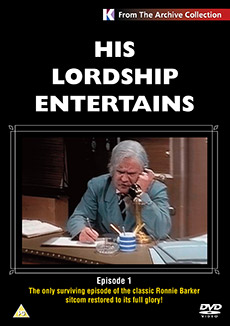
Ronnie Barker's famous character Lord Rustless swapped channels from ITV for this short BBC sitcom set in a hotel.
Originally shown from colour videotape, those recordings were wiped. During ITV's Raiders Of The Lost Archives campaign in 2007 (which was run by Kaleidoscope) ITV were offered episode one of His Lordship Entertains from New Zealand. ITV declined because it was a BBC show but Kaleidoscope accepted and the print was shipped to the BBC and transferred.
Due to modern technology, Jonathan Coley and his amazing colour restoration processes created a new colour master to be screened at the BFI's annual Missing Believed Wiped event on 27th November 2021. With some further adjustments since, it is now available to own on DVD.
First released: Tuesday 31st May 2022
- Distributor: Kaleidoscope
- Region: 2
- Discs: 1
- Minutes: 30
- Catalogue: KPHLE
![]() Buy and sell old and new items
Buy and sell old and new items
Search for this product on eBay
BCG may earn commission on sales generated through the links above.
Keeping Up Appearances - The Complete Collection

This is the complete series of Keeping Up Appearances, where you can witness Hyacinth Bucket (pronounced Bouquet, don't you know), and her long-suffering husband Richard, impressing and distressing their family and neighbours. "Daddy" is still fighting the Second World War and regularly causes havoc with his antics, Richard fights daily against early retirement, and sister Daisy and brother-in-law Onslow cause our house-proud Mrs Bouquet much embarrassment and humiliation.
Featuring every episode of the entire series in an 8-disc box set, this hilarious BBC comedy is one fantastic 40-episode package, including ALL the Christmas specials!
So come in for a Darjeeling tea and visit our heroine Hyacinth Bucket as she fights the ever declining moral of fabric Britain... just whatever you do... don't brush against her walls!
First released: Monday 28th November 2022
- Distributor: BBC
- Region: 2
- Discs: 8
- Minutes: 1,328
- Subtitles: English
- Catalogue: BBCDVD4529
![]() Buy and sell old and new items
Buy and sell old and new items
Search for this product on eBay
BCG may earn commission on sales generated through the links above.
The Two Ronnies - The Complete Collection

From 1971 to 1987, over 12 series, four Christmas specials and two classic silent films, Ronnie Barker and Ronnie Corbett combined to produce one of the most popular television comedy series ever made.
From their introduction, "And in a packed programme tonight..." to the "Goodnight from him" finale, viewers savoured every moment. The 'Four Candles' and 'Mastermind' sketches, the Piggy Malone and Charley Farley stories and the hilarious musical numbers have a special place in viewers' hearts, but these series are packed with so many moments of comic genius.
This mammoth 27-disc collection contains 93 full episodes of The Two Ronnies, their acclaimed silent comedy films By The Sea and The Picnic, as well as The One Ronnie, Ronnie Corbett's 2010 sketch show featuring Harry Enfield, Catherine Tate, Rob Brydon, Miranda Hart, Matt Lucas and David Walliams.
First released: Monday 17th September 2012
- Released: Monday 14th November 2016
- Distributor: 2 Entertain
- Region: 2 & 4
- Discs: 27
- Minutes: 4,337
- Subtitles: English
![]() Buy and sell old and new items
Buy and sell old and new items
Search for this product on eBay
BCG may earn commission on sales generated through the links above.
- Distributor: 2 Entertain
- Region: 2
- Discs: 27
- Catalogue: BBCDVD3455
![]() Buy and sell old and new items
Buy and sell old and new items
Search for this product on eBay
BCG may earn commission on sales generated through the links above.

